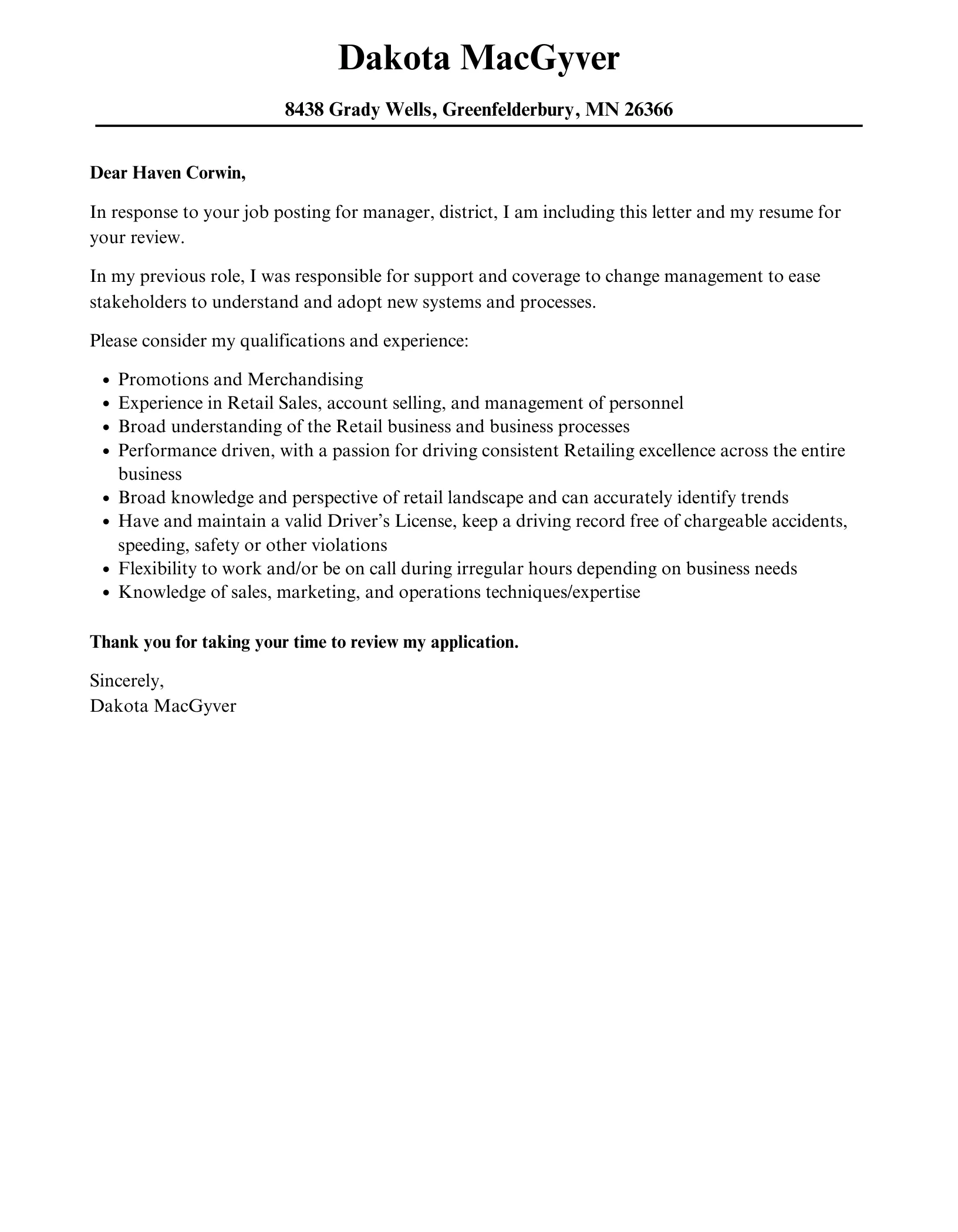Crafting a Compelling Cover Letter for District Manager Positions
A well-crafted cover letter is your first opportunity to make a strong impression and secure an interview for a District Manager position. It’s more than just a formality it’s a crucial tool to showcase your qualifications, experience, and leadership potential. The cover letter provides a platform to explain why you are the ideal candidate, demonstrating your understanding of the role and your enthusiasm for the company. It allows you to go beyond the bullet points of your resume and connect with the hiring manager on a personal level, highlighting your unique skills and achievements. Think of your cover letter as your personal sales pitch, designed to capture the attention of the reader and convince them that you deserve a closer look.
Understanding the District Manager Role
Before you start writing, it’s essential to have a clear understanding of what a District Manager does. District Managers are responsible for overseeing multiple locations within a specific geographic area, ensuring that each location meets its performance goals, operational standards, and profitability targets. They are essentially the bridge between the corporate office and the individual store or branch managers, providing guidance, support, and leadership to their teams. A District Manager’s role is multifaceted, encompassing strategic planning, financial analysis, employee development, and customer service improvement. Understanding the scope and responsibilities of the role is fundamental to crafting a cover letter that resonates with the hiring manager.
Key Responsibilities of a District Manager
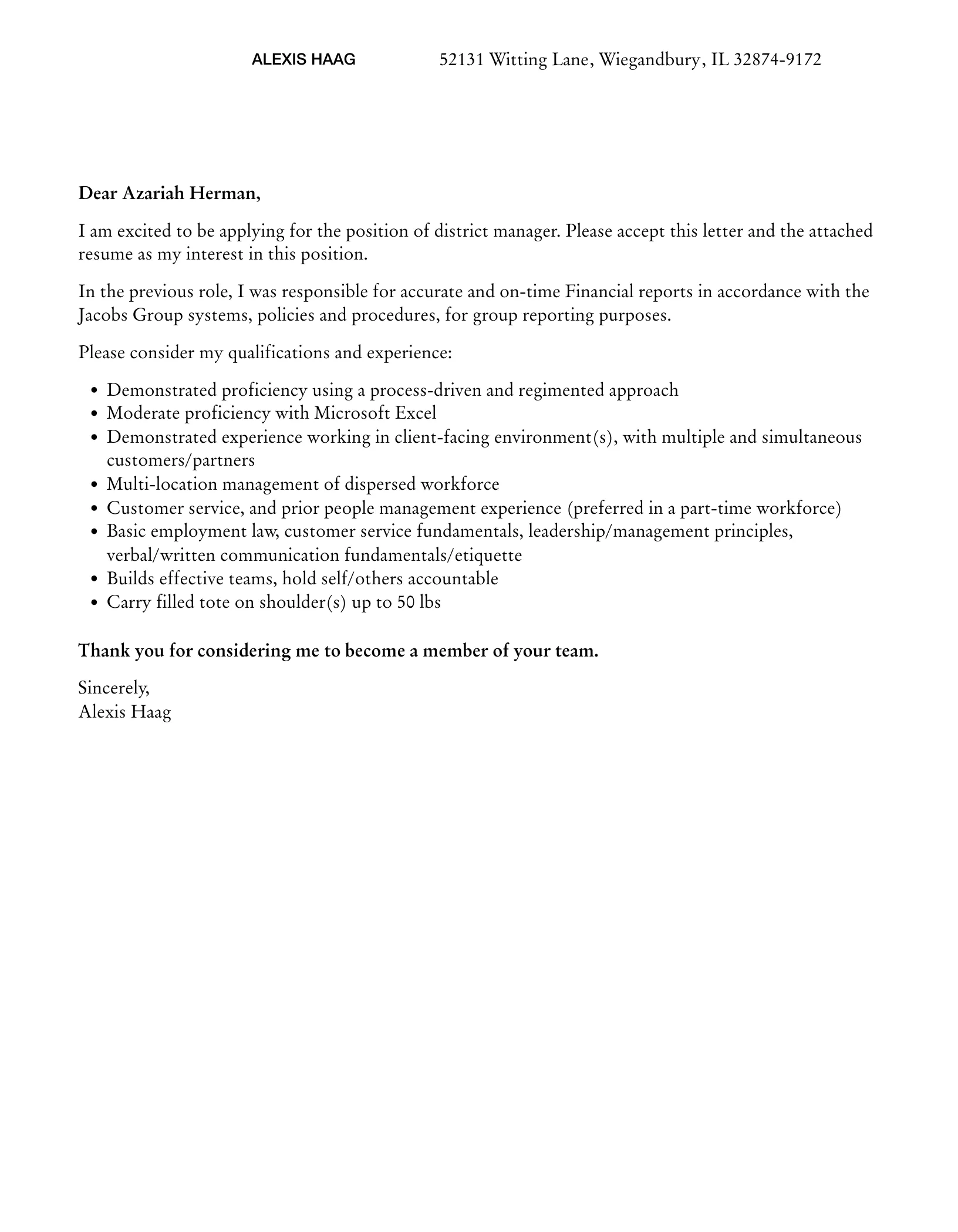
District Managers have a wide range of responsibilities, including but not limited to, driving sales and profitability, ensuring operational efficiency, managing budgets, and developing and motivating their teams. They are expected to analyze sales data, identify areas for improvement, and implement strategies to achieve targets. They also play a critical role in employee recruitment, training, and performance management. Furthermore, they ensure that each location complies with company policies, industry regulations, and customer service standards. Highlighting your experience in these areas will directly align your cover letter to the job requirements.
Why a Strong Cover Letter Matters
A well-written cover letter demonstrates your professionalism, attention to detail, and genuine interest in the position. It allows you to elaborate on your skills and experience in a way that a resume cannot, by providing specific examples and quantifying your achievements. A strong cover letter can differentiate you from other candidates by showcasing your unique qualities and how you align with the company’s values. It shows that you have taken the time to research the company and understand the specific requirements of the job. This effort demonstrates to the hiring manager that you are serious about the opportunity and willing to go the extra mile.
Highlighting Your Skills and Experience
Your cover letter should clearly showcase your relevant skills and experience that align with the District Manager position. Focus on the skills and experience most relevant to the job description. Highlight your achievements using quantifiable data and demonstrate how you have added value in previous roles. Avoid simply listing your job duties, instead focus on showcasing your accomplishments using the STAR method Situation, Task, Action, Result. This will make your cover letter more impactful and persuasive. The hiring manager will want to know not just what you did, but what you achieved.
Showcasing Leadership Abilities
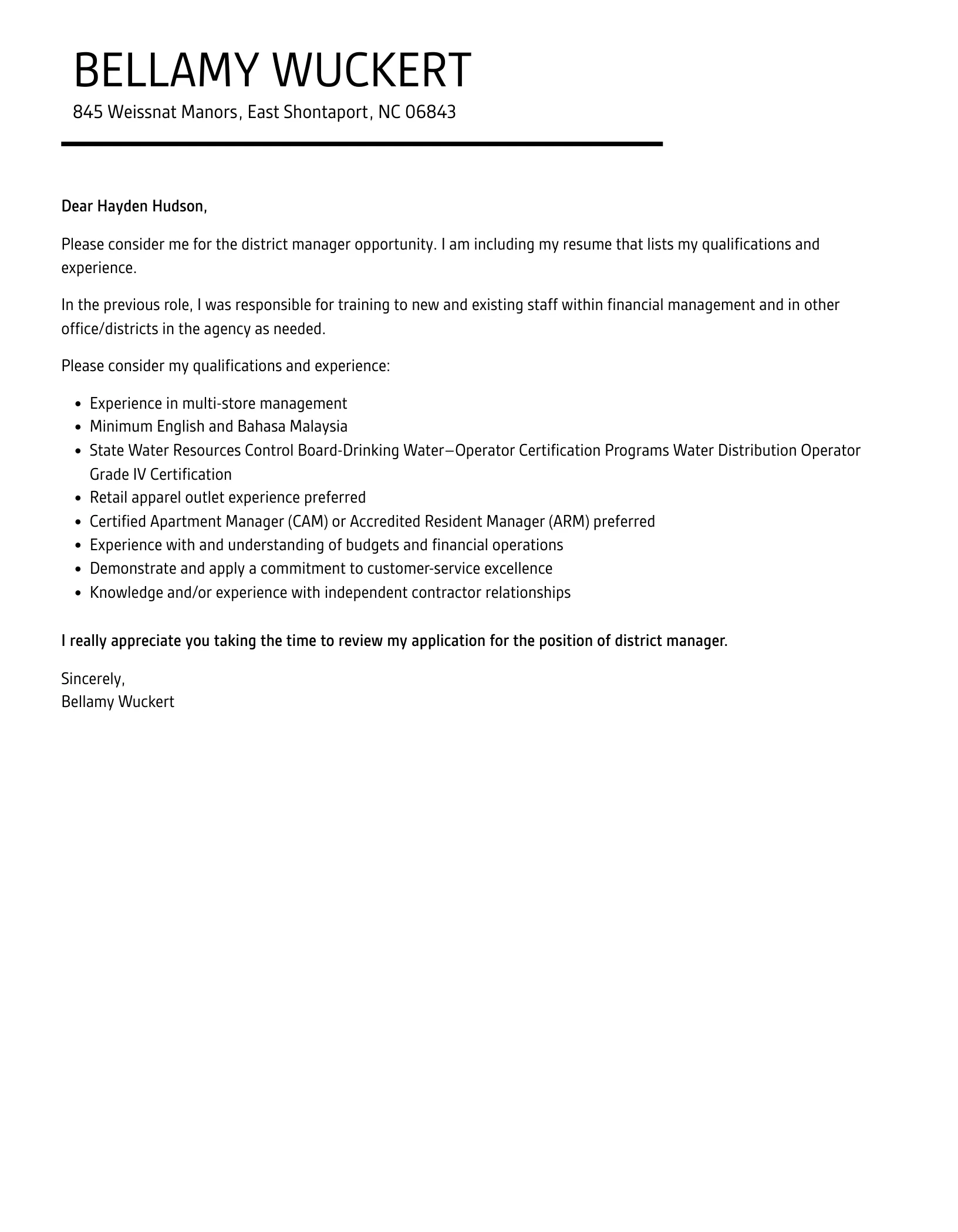
Leadership skills are paramount for a District Manager. Emphasize your ability to motivate, mentor, and develop teams. Provide specific examples of how you have successfully led teams to achieve their goals, improved performance, or resolved conflicts. Illustrate your communication skills, decision-making abilities, and your capacity to create a positive and productive work environment. Show the hiring manager how you inspire your team to excel and achieve results. Leadership goes beyond giving orders; it’s about inspiring, motivating, and empowering others to succeed.
Providing Examples of Successful Management
Provide concrete examples of your successful management strategies. If you implemented a new training program, describe the steps you took, the results you achieved, and the impact it had on your team’s performance. If you successfully turned around a struggling location, explain the challenges you faced, the actions you took, and the measurable improvements that resulted. Quantify your achievements whenever possible, such as increases in sales, reductions in costs, or improvements in employee retention rates. Highlighting specific instances of your leadership skills will validate your claims.
Demonstrating Financial Acumen
District Managers must have a strong understanding of financial concepts, including budgeting, profit and loss statements, and cost control. Emphasize your ability to manage budgets effectively, analyze financial data, and identify opportunities to increase profitability. Provide examples of how you have successfully managed budgets, reduced expenses, or increased revenue in previous roles. Your cover letter is an opportunity to show that you have a strong grasp of financial principles and can make data-driven decisions that positively impact the bottom line. Be sure to use the language of finance to express your capabilities.
Quantifying Achievements
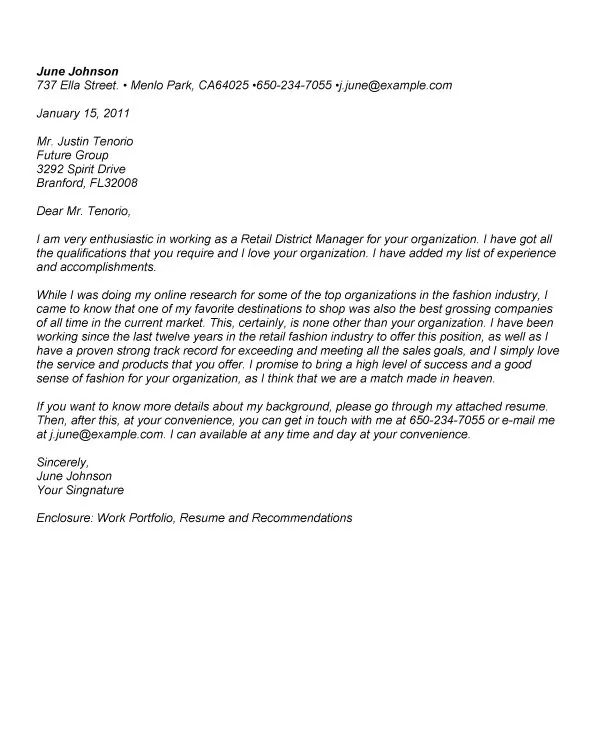
Whenever possible, quantify your achievements. Instead of saying, “Increased sales,” state, “Increased sales by 15% within six months.” Instead of saying, “Improved customer satisfaction,” state, “Improved customer satisfaction scores by 20%, resulting in a 10% increase in repeat business.” Numbers make your achievements more tangible and demonstrate the impact of your contributions. Use specific data and metrics to demonstrate your capabilities and provide a clear picture of your achievements. Quantifying your achievements adds credibility and shows the hiring manager the value you can bring to the company.
Emphasizing Relevant Industry Experience
Highlight your experience in the specific industry, and focus on the transferable skills from previous roles. If you have experience in retail, hospitality, or a similar industry, showcase how your knowledge and expertise align with the requirements of the District Manager position. Describe how you have successfully navigated the challenges and opportunities within the industry. Your familiarity with industry trends, best practices, and challenges can give you a significant advantage. Tailor your experience to demonstrate your understanding of the sector and your preparedness for the role.
Tailoring Your Cover Letter
Generic cover letters are easily spotted and often discarded. Tailor your cover letter to each specific job opportunity to demonstrate your genuine interest and understanding of the company and the role. This shows that you have taken the time to research the company and understand their specific needs. By personalizing your cover letter, you showcase your attention to detail and your ability to connect with the hiring manager.
Researching the Company
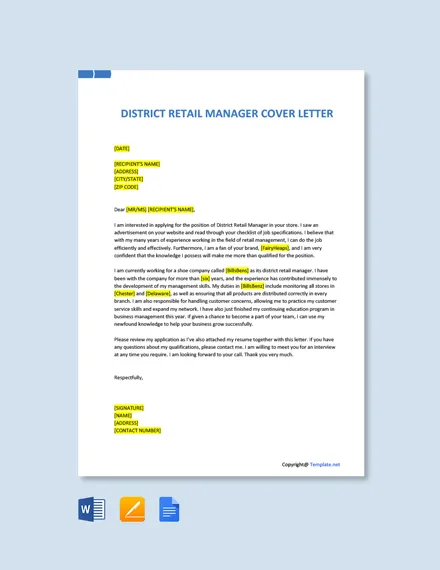
Before you start writing, thoroughly research the company. Visit their website, read their mission statement, and look at their recent news and press releases. Understand their values, culture, and strategic goals. This information will help you tailor your cover letter to demonstrate how your skills and experience align with the company’s needs and goals. Mention specific aspects of the company that resonate with you, and explain why you are excited about the opportunity. Demonstrating your knowledge of the company’s business demonstrates a keen interest in the opportunity.
Matching Skills to the Job Description
Carefully review the job description and identify the key skills and qualifications that the employer is seeking. Then, carefully match your skills and experience to those requirements. Highlight how your skills and experience align with each of the listed qualifications. Use keywords from the job description throughout your cover letter to demonstrate that you are a strong fit for the role. Referencing specific requirements shows that you have carefully analyzed the job description and know what is expected.
Using Keywords Effectively
Many companies use Applicant Tracking Systems (ATS) to scan cover letters and resumes for keywords. Make sure to incorporate relevant keywords from the job description into your cover letter. Use these keywords naturally and strategically throughout the text, particularly in the opening and closing paragraphs. While it is important to include keywords, avoid keyword stuffing which can make your cover letter sound unnatural and be rejected. Aim for a balance between incorporating keywords and maintaining a conversational writing style.
Structuring Your Cover Letter
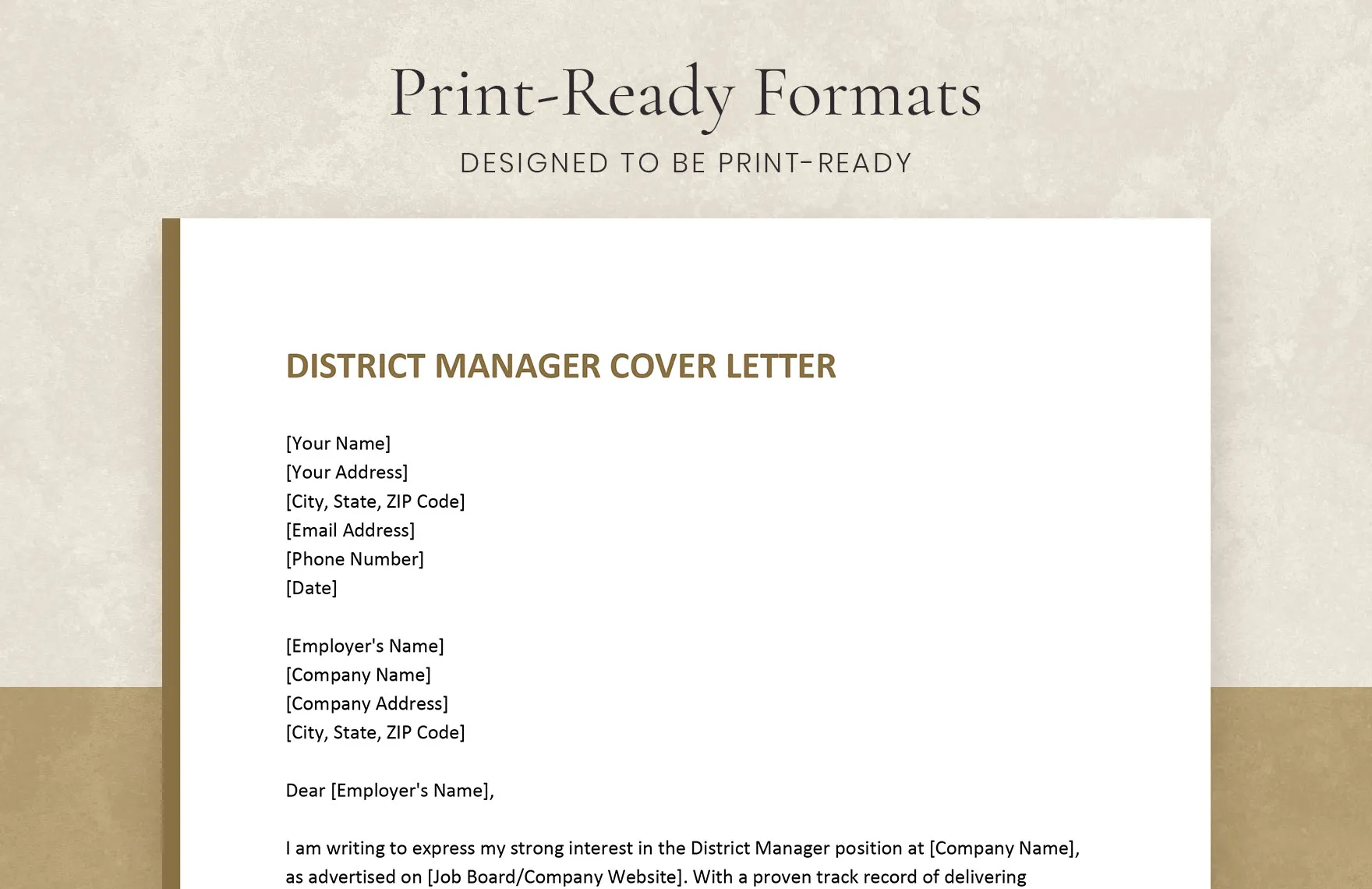
A well-structured cover letter is easy to read and conveys your message clearly. Use a professional format and organize your content logically. A standard cover letter typically includes an introduction, body paragraphs, and a closing. The formatting is key to presenting a professional appearance, so take care with layout and spacing to make your cover letter appealing.
Contact Information and Salutation
Start with your contact information including your name, address, phone number, and email address. Then, address the hiring manager by name if possible. If you can’t find the hiring manager’s name, use a professional salutation like “Dear Hiring Manager.” Ensure that you use a professional email address and maintain accurate contact details.
Opening Paragraph and Hook
Your opening paragraph should immediately grab the reader’s attention. State the position you are applying for and mention where you found the job posting. Briefly highlight your most relevant skills and experience, and state why you are excited about the opportunity. Create a strong first impression by stating the purpose of the letter and expressing your enthusiasm for the position. Show the hiring manager that you are a well-matched candidate and keen to begin the hiring process.
Body Paragraphs and Key Accomplishments
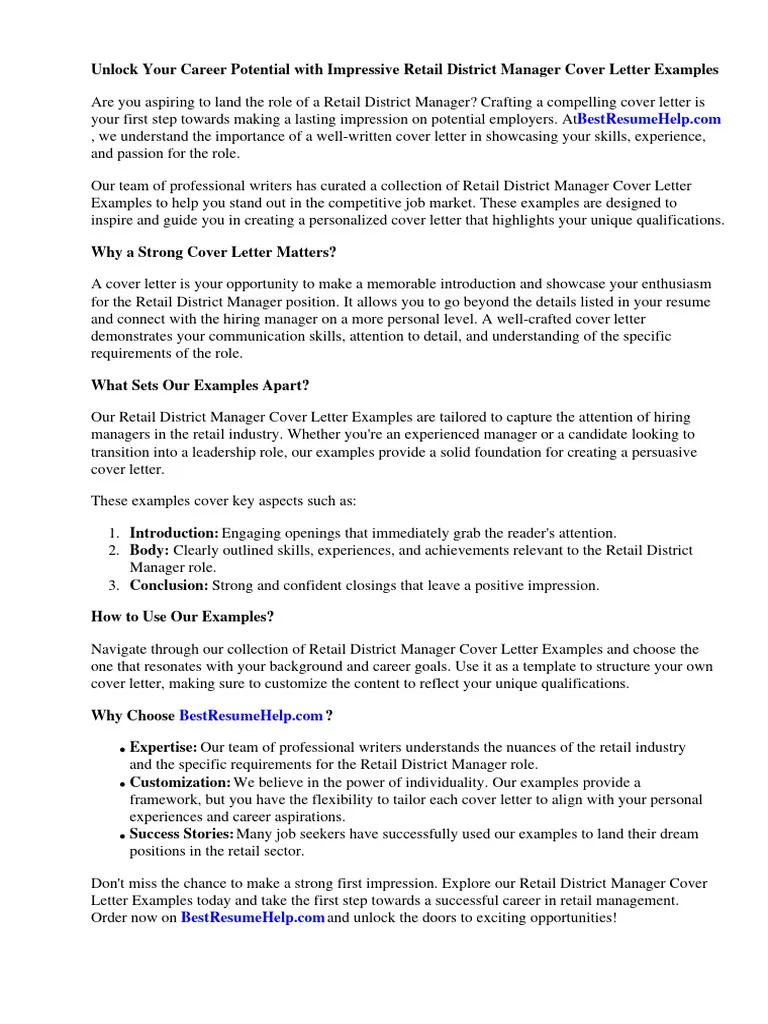
Use the body paragraphs to expand on your qualifications and provide specific examples of your achievements. Structure your paragraphs to showcase your key skills, experiences, and how they align with the job requirements. Focus on your accomplishments, not just your responsibilities, and use quantifiable data to demonstrate your value. Use the STAR method to describe how you approached specific situations and what the results were. Show your skills with examples that resonate and highlight your understanding of the role.
Call to Action and Closing
End your cover letter with a strong call to action. Express your interest in an interview and reiterate your enthusiasm for the position. Thank the hiring manager for their time and consideration and include your contact information again. Use a professional closing such as “Sincerely” or “Best regards.” End your letter with a clear request for the interview and confidence in your ability to succeed. Close with a professional tone and look forward to hearing back.
Proofreading and Editing
Before submitting your cover letter, carefully proofread and edit it to ensure that it is free of errors. Errors and typos can damage your credibility and undermine your chances of getting an interview. Take extra care to look at every word and every sentence to be sure it conveys your message effectively.
Checking for Grammatical Errors and Typos
Grammatical errors and typos can make your cover letter look unprofessional. Use a grammar checker and spell checker to catch any mistakes. Read your cover letter aloud to identify any awkward phrasing or sentences. Pay close attention to punctuation, spelling, and grammar. Ensure that the writing is clear, concise, and easy to understand.
Ensuring a Professional Tone
Maintain a professional tone throughout your cover letter. Use formal language and avoid slang, contractions, and informal expressions. Ensure that your tone is respectful and enthusiastic. Proofread your cover letter and remove any inappropriate or casual language. The tone should convey professionalism and sincerity and show that you are a serious candidate.
Seeking Feedback
Ask a friend, family member, or career counselor to review your cover letter. Ask them to check for errors, provide feedback on your writing style, and offer suggestions for improvement. A second pair of eyes can catch mistakes that you may have missed. Getting feedback from others can help ensure that your cover letter is as strong as possible. Consider receiving feedback from multiple people for the best results.
